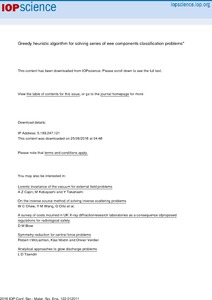Greedy heuristic algorithm for solving series of EEEcomponents classification problems
Скачать файл:
URI (для ссылок/цитирований):
https://elib.sfu-kras.ru/handle/2311/27972Автор:
Kazakovtsev, L. A.
Antamoshkin, A. N.
Fedosov, V. V.
Коллективный автор:
Институт управления бизнес-процессами и экономики
Кафедра экономики и информационных технологий менеджмента
Дата:
2016Журнал:
IOP Conference Series: Materials Science and EngineeringКвартиль журнала в Scopus:
без квартиляБиблиографическое описание:
Kazakovtsev, L. A. Greedy heuristic algorithm for solving series of EEEcomponents classification problems [Текст] / L. A. Kazakovtsev, A. N. Antamoshkin, V. V. Fedosov // IOP Conference Series: Materials Science and Engineering. — 2016. — Т. 122 (№ 012011). — С. 1-7Аннотация:
Algorithms based on using the agglomerative greedy heuristics demonstrate precise and stable results for clustering problems based on k- means and p-median models. Such algorithms are successfully implemented in the processes of production of specialized EEE components for using in space systems which include testing each EEE device and detection of homogeneous production batches of the EEE components based on results of the tests using p-median models. In this paper, authors propose a new version of the genetic algorithm with the greedy agglomerative heuristic which allows solving series of problems. Such algorithm is useful for solving the k-means and p-median clustering problems when the number of clusters is unknown. Computational experiments on real data show that the preciseness of the result decreases insignificantly in comparison with the initial genetic algorithm for solving a single problem.

